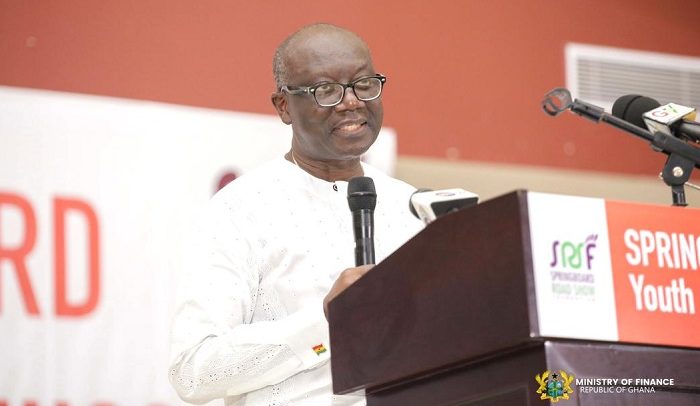Ken Ofori-Atta
GOVERNMENT HAS begun a public engagement and sensitisation campaign across the country on the proposed electronic payment tax popularly known as E-Levy, intended to boost revenue for development.
Finance Minister Ken Ofori-Atta said the intention is to communicate clearly on the proposed mechanics of the E-Levy, its potential benefits to Ghanaians “within the spirit of burden sharing that must guide us in our development efforts as we move Ghana Beyond Aid.”
Addressing the media Wednesday evening in Accra, the Minister said the government intended to use the money to create jobs and grow the country’s private sector to employ more of the youth; accelerate the digitalisation agenda to bring more convenience to Ghanaians; and enhance the security of the digital platforms.
According to him, proceeds from the E-Levy would also be used to aggressively expand the road infrastructure agenda, reduce the nation’s dependence on debt, and reduce the crowding out of the private sector to improve access to credit.
Mr. Ofori-Atta indicated that contrary to other assessments, Ghana’s economy will continue to get stronger.
The Minister disclosed that the concerns of Ghanaians’ rating agencies are hinged on revenue mobilisation, lack of access to international market and the E-Levy impasse, and assured that the nation shall overcome all.
“Similar to most economies, we are emerging from the devastating impact of the COVID-19 pandemic. In spite of this, we do not face any imminent external imbalance,” he declared, and added that “We have over 5 months import cover which is well above our internal target of 4 months and better than the average over the previous two decades.”
Although the current debt-to-GDP ratio, as at the end of November 2021 is 78.4%, he said it revealed a reduction in the rate of debt accumulation by 34% in 2020 to 18% as at November 2021.
Mr. Ofori-Atta stated that the government projects to achieve a positive primary balance target to improve stability and reduction in the debt to GDP ratio in 2022 through the medium term.
He continued that “This Government has largely met the targets it set for itself in the past,” adding that “Stable growth (average of 5.3% between 2017 and 2020), controlled inflation (average of 9.88% between 2017 and 2020) and a more stable currency (average depreciation of 7.5% between 2017 and 2020, 4.1% in 2021) have been the hallmarks of this administration, compared to an average real GDP growth of 3.94%, average inflation of 15.9% and average currency depreciation of 17.78% for the previous administration.”
He said the government also had begun strengthening expenditure management in 2022 and beyond, and that to ensure that “We match all expenditures to revenue inflows, all expenditure commitments in 2022 will be adjusted to match revenue collection.”
“Therefore, in accordance with Section 25 of the Public Financial Management Act (PFMA) law, the quarterly expenditure ceilings of with that background, let me share with you why we need the E-Levy, which is one of the key tax measures of our 2022 Budget, and why it is important to our lives as Ghanaians and achieving our aim of moving beyond Aid. Our revenue to GDP ratio has languished between 11.3% in 2016 to 12.5% in 2021 compared to 16% to 20% with our neighbours, also our VAT revenue at 11 – 13% compared to 18-44% of peers.”
The Minister maintained that “Clearly, this is an unsustainable way to anchor the extensive transformation agenda (articulated in our Ghana CARES ‘Obaatanpa’ Programme)” and added that this is further compounded by the fact that out of the total population of 30.8 million only about 2.4 million people pay personal income taxes.
“The question is: what is the most efficient way to bring all Ghanaians into the tax net to build a Ghana Beyond Aid that we and our children and grandchildren will be proud of.”
“The most efficient way must take into consideration technology and the structural changes in the tax handles, the fact that we have over 40.5 million mobile phone subscribers and over 17.1 million active mobile money subscribers,” he asserted.
According to him, it is instructive to note that the total value of transactions on mobile money grew by a CAGR of 65% between 2016 and 2021; rising from GH¢78.5 billion in 2016 to an estimated GH¢953.2 billion in 2021.
“Over the past few months, I have made several references to ‘burden-sharing’. Essentially, we are at the stage in our national development where we must all play our part and all put our shoulders to the wheels.”
BY Ernest Kofi Adu

